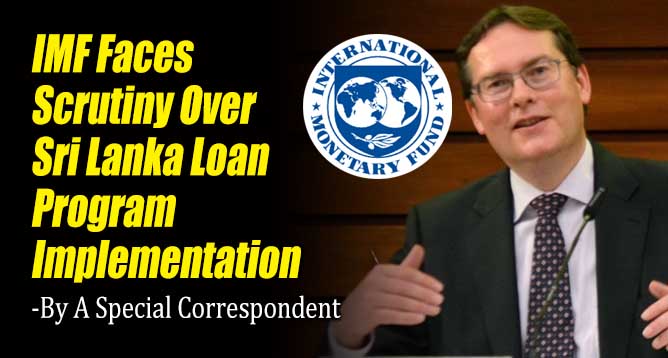- By A Special Correspondent

(Lanka-e-News -24.March.2024, 5.15 PM) During the second review of Sri Lanka's $3 billion, 4-year loan program with the International Monetary Fund (IMF), officials from various sectors engaged in discussions with the IMF mission. Peter Breuer, the IMF Senior Mission Chief, disclosed that they received numerous proposals during their meetings with government representatives, members of the opposition, and civil society organizations.
Breuer addressed the issue of elections, stating, “Concerning the election, yes, we heard many different proposals.” This statement suggests that the topic of elections was a significant point of discussion during the review process. However, Breuer did not provide further details on the nature of these proposals or the specific concerns raised regarding elections in Sri Lanka.
The International Monetary Fund (IMF) finds itself under increasing scrutiny as it navigates the implementation of its loan program in Sri Lanka, a country embroiled in political controversy and economic turmoil. At the centre of this debate is Peter Breuer, the IMF Senior Mission Chief tasked with overseeing the program, amidst concerns over the legitimacy of Sri Lanka's leadership and the transparency of the IMF's actions.
1-Legitimacy of Leadership: Critics question the IMF's decision to roll out its program in Sri Lanka under an unelected President, who lacks a mandate from the Sri Lankan public. With the cloud of accusations surrounding the president's involvement in a Bond scam, doubts persist regarding the legitimacy of the government's authority to engage in significant economic reforms.
2-President's Controversial Past: Further complicating matters is President Ranil's controversial past, particularly his alleged involvement in the Bond scam. Skepticism arises regarding the IMF's ability to collaborate effectively with a leader tainted by accusations of financial misconduct.
3-Transparency Concerns: Transparency remains a pressing issue in the IMF's Sri Lanka loan program. Questions abound regarding the level of transparency maintained by both the IMF and the Sri Lankan government in the implementation of economic policies and the allocation of funds.
4-Taxation Policies: Criticism mounts over the IMF's decision to introduce higher taxes, disproportionately burdening the poorest segments of Sri Lankan society. Critics argue that the IMF should prioritize holding corrupt politicians accountable for misappropriating funds rather than imposing heavier tax burdens on the most vulnerable.
5-Lack of Engagement: Concerns are raised over the IMF's failure to engage with key stakeholders in Sri Lanka, including professional organizations, industrialists, trade unions, and farmers. This lack of consultation risks alienating crucial voices in the formulation and execution of economic policies.
6-Creditor Dynamics: Questions arise over the IMF's treatment of international sovereign bondholders and overseas creditors compared to local creditors. Critics argue that local creditors are unfairly penalized by IMF policies, exacerbating economic inequalities within Sri Lanka.
7-Value for Money: Doubts persist regarding the value of the IMF program to Sri Lankan taxpayers. With mounting economic challenges and social unrest, concerns are raised over whether the IMF's interventions will yield tangible benefits for ordinary citizens.
8-Privatization Demands: The IMF's insistence on privatizing national health and education systems sparks outrage, particularly due to the potential adverse impact on the poorest segments of Sri Lankan society. Critics argue that such measures could exacerbate socioeconomic disparities and limit access to essential services.
The inclusion of discussions on elections highlights the broader context within which the IMF loan program operates in Sri Lanka. Political stability and democratic processes are crucial factors that can influence the success and implementation of economic reforms supported by international financial institutions such as the IMF, ABD.
The International Monetary Fund's (IMF) program in Sri Lanka faces potential hurdles as the country grapples with a perceived deficiency in the rule of law. Recent accusations of judicial corruption have cast a shadow over the legal system, raising doubts about the effectiveness of implementing economic reforms supported by the IMF. Moreover, the decision to station IMF representatives within the Sri Lankan Finance Ministry underscores the complexities of navigating governance issues while pursuing economic stabilization measures.
Concerns about the rule of law in Sri Lanka have been exacerbated by startling allegations made by a prominent lawyer regarding judicial corruption during the hearing at Supreme Court of Sri Lanka, lawyer was remanded by Judges when lawyer submitted his case by saying Senior Judges are involving in various corruption. These accusations, which have reverberated across the nation, highlight systemic challenges that could undermine the credibility of legal institutions. In such an environment, the IMF's efforts to promote fiscal discipline and transparency may face resistance or skepticism from the public and key stakeholders.
Adding to the complexity, the IMF's decision to station personnel within the Sri Lankan Finance Ministry underscores the need for close collaboration with local authorities. While intended to facilitate the implementation of the loan program and ensure adherence to IMF conditions, this move raises questions about sovereignty and transparency. Critics argue that such close proximity to government institutions could compromise the IMF's ability to maintain impartiality and hold local authorities accountable for their actions.
Peter Breuer and the IMF team must understand that Sri Lanka is a highly educated nation, which demands IMF terms and conditions in detail, rather than rushing true the reforms, which already affected millions of households have been disconnected from the electricity supply, Thousands of SME businesses shut down and while Peter Breuer and IMF team having the best time of the life inside the 5 star hotels. Peter Breuer and the IMF team must understand almost a million Sri Lankans migrated overseas looking for jobs to feed their family members, and millions skipped their meals, 15% population struggling to feed themselves, even after the 13th IMF program. IMF must deliver a program which is tailor-made to Sri Lanka rather, Peter Breuer's fantasy framework. If the IMF program causes severe hardship to ordinary Sri Lankans, then Peter Breuer and his team will be sued for compensation by Sri Lankans for delivering a half-baked program.
---------------------------
by (2024-03-24 12:06:00)
Leave a Reply